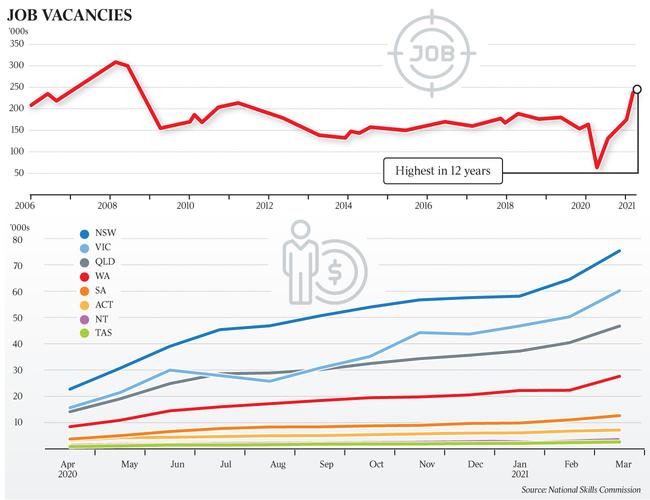Job vacancies hit 12-year record
Job vacancies surged by 19 per cent in March, even though there are 500,000 more people on JobSeeker than before the pandemic.

National job vacancies are at a 12-year high even though the number of people on JobSeeker is 500,000 more than before the arrival of COVID-19.
Job vacancies surged by 19 per cent — or 38,200 — to 238,700 in March, new data from the National Skills Commission shows.
That was more than double the 117,200 recorded a year earlier, and more than triple the roughly 69,000 job vacancies in April.
The new data emerged as hospitality businesses said they were struggling to fill job vacancies, which would undermine their ability to expand as COVID-19 restrictions are lifted.
Economists say shortages of job applicants could slow the economic recovery, with other industries, such as residential construction, facing delays because of a shortage in key tradespeople.
Despite the surge in job vacancies and reports of skills shortages, nearly 1.3 million Australians remained on JobSeeker and Youth Allowance payments in March.
This was 486,000 more than in February last year before the pandemic hit, according to the Department of Social Services.
Merivale head of human resources Jessica Furolo told a parliamentary committee on skilled migration on Monday that her organisation was spending $300,000 more on trying to recruit workers, but was receiving only half the number of applications as pre-COVID.
Merivale employs about 2500 people, and was looking to hire a further 200 staff, she said. “The lack of applicants is alarming. We have serious concerns about the return to normal operation. The single impediment to growing our business is finding both the skilled and unskilled labour.”

Sydney Harbour Marriott Hotel general manager Bernhard Langer said Australia was at risk of losing the capacity to service international business travellers and tourists once borders reopened. He noted that the newly opened W Hotel in Melbourne was “only operating at half-capacity because they do not have staff to service the hotel”.
ANZ economist Catherine Birch said the potential skills — and geographic — mismatch between the extra half a million people on unemployment benefits and the surging labour demand in industries such as construction, hospitality and professional services was a “risk” to the national labour market recovery.
The Commonwealth Bank significantly upgraded its employment forecasts for this year, predicting unemployment would drop to 5 per cent by the end of the year, versus a previous estimate of 5.5 per cent and against the 5.8 per cent jobless rate recorded in February. Unemployment would then fall to 4.7 per cent by the end of 2022, it estimated.
CBA economics Gareth Aird said the lack of migration meant employers were unable to get access to a global talent pool, and this would lead to upward wages pressure earlier than the Reserve Bank had predicted.
Mr Aird said he expected wage growth would lift to 2.7 per cent by the end of next year, and the level of unemployment at which pay started to lift meaningfully was around 4.5-5 per cent. “It may be the case that wages and underlying inflation lift a little earlier than our profile implies, given that pockets of skill shortages are already emerging,” he said.
“It could also be the case that wages growth stalls in mid-2022 if growth in the supply of labour accelerates too quickly when international borders are reopened.”
The closure of international borders last year and the Morrison government decision to not offer COVID income support to visa holders have robbed the hospitality industry of one of its major sources of workers — backpackers and overseas students.

The National Skills Commission is undertaking analysis on what occupations should be included in the skills priority list, which will help guide policy responses around migration and training incentives. Due to be released on July 1, this list will outline the occupations that are in shortage across Australia, as well as providing an indication of where future shortages could lie.
National Skills Commissioner Adam Boyton would not confirm whether hospitality jobs would be included, but said: “Stakeholder feedback to date has indicated that there is demand for chefs, with input from a range of stakeholders received relating to this occupation in particular”.
University of Melbourne professor Jeff Borland said the number of vacant jobs as a proportion of total employment plus vacancies hit 2.2 per cent in February — far above any previous reading in an ABS series dating to 1978.
Professor Borland said the fact that the largest increases in job vacancies were in sectors that had also reported strongest employment growth since the depths of the COVID recession suggested the “notable” phenomenon of record vacancy rates was likely a temporary one. “I think what that means is the speed of change has been so rapid it’s taking time for the labour market adjustment to catch up. The fact the vacancy rate has increased across all industries tells us this is an economy-wide phenomenon to do with the pace of change.
Cobargo Hotel-Motel owner David Allen said his pub had the “biggest Easter season we’ve ever had, as did most other tourism operators down the south coast”, but his 25 staff, including one chef, were struggling to cope, and an inability to get workers and apprentices meant “this demand was unsustainable”.








To join the conversation, please log in. Don't have an account? Register
Join the conversation, you are commenting as Logout